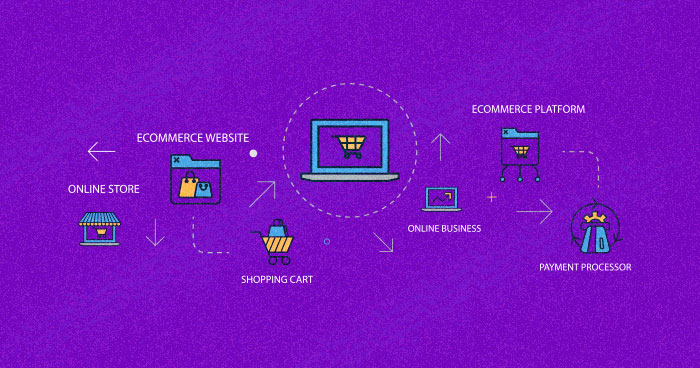
One of the most important decisions that you have to make when running an ecommerce store is to find an appropriate payment processor. Ecommerce payment processing is important for businesses that want to grow because it allows you to take payments from customers online and have them transferred to your own accounts.
Opening an ecommerce store is a pretty exciting time for entrepreneurs, but you also have to be very careful. Most entrepreneurs don’t know much about ecommerce payment processing, but they do understand the need for a processor that allows customers to charge their cards online.
In this article, we shall talk about different ecommerce payment methods, and focus on some of the most popular ecommerce payment processors out there.
The Key Essentials
The simple process of accepting payments from customers is known as ecommerce payment processing. This is done through a secure gateway that protects the customer’s card information and helps establish a secure connection with the merchant. Here are the key essentials that you need to know regarding ecommerce payment processing:
- Your ecommerce store links to a secure payment processor
- The customer enters their card information in the secure payment gateway, which encrypts the information before sending it to the processor.
- The processor sends a signal to the bank to confirm if available funds or limits are available for the payment.
- If the transaction is approved, it goes through. The customer’s account is debited by the specific amount.
The whole process takes hardly a few seconds, as you probably already know if you have bought anything online before. In most cases, the costs of ecommerce packaging is also incorporated within the final shipping cost.
See Beyond Numbers with Our Ecommerce Sales Analysis Template
Knowledge is power, especially in ecommerce. Download our FREE Ecommerce Sales Analysis Template to analyze trends, identify top performers, and uncover hidden opportunities.
Thank You
Your list is on it’s Way to Your Inbox.
Understanding Ecommerce Payment Processors, Merchant Accounts, and Payment Gateways

To understand how the whole process of receiving an ecommerce payment works, it’s important that you get a better idea about the key terms: payment processors, merchant accounts, and payment gateways. You might have already seen these being bandied about, but it’s best to clarify them.
What is an Ecommerce Payment Processor?
An ecommerce payment processor simply takes the information from the payment gateway and then verifies whether it’s true or not. The processor checks whether the customer has funds available in their account and then deposits those funds in your merchant account.
Understanding Merchant Accounts
A merchant account is an account opened by your ecommerce store in a bank. This is the account where funds are going to be received after they have been processed.
What is a Payment Gateway?
A payment gateway simply acts as a liaison between your ecommerce store and the payment processor. It is an essential component of your ecommerce payment processing solution. It relays information added in your ecommerce store in an encrypted form to the payment processor.
What is Tokenization?
One of the terms that you might have read every now and then with ecommerce payment processing is “tokenization.” Tokenization simply refers to the ability of your ecommerce platform to save a user’s payment information so that it can be used later on. Storing credit card information on your website is a recipe for disaster, and should never be allowed.
However, if you want to store a customer’s information for use later on, the payment details need to be tokenized.
Instead of saving the actual credit card details, your website saves a token received from the ecommerce payment system or ecommerce credit card processor. This way, your platform only uses the token instead of the actual number for charging clients. This offers protection because in case your website gets hacked, nobody else can use the tokens (they are tied to your merchant account only).
Tokenization is essential if you want to charge a subscription payment or allow your users to simply save their payment information on the platform.
Securing Your Website – SSL and PCI Compliance
In order to securely process payments, you need an SSL certificate. It doesn’t matter if your ecommerce credit card processor requires a SSL certificate or not, you still need one. You can get one for free if you are on the Cloudways platform, or you can buy one and install it on your website.
An SSL certificate helps build trust, and also improves conversions. In this day and age, your website should absolutely have one.
Then, you have PCI compliance. Many ecommerce payment processors have heard the term, but they don’t know what it really entails. PCI compliance simply refers to the regulations that merchants are supposed to follow so that they can accept payments online.
Depending upon the level of compliance, the layers of security used on your website are going to vary. Ideally, since most ecommerce platforms don’t handle payments on-site, you don’t have to worry about PCI compliance. But, if you process payments on-site, it’s best to talk to an expert about payment gateway integrations and PCI compliance.
5 Factors to Consider When Selecting a Payment Gateway
Installing an ecommerce payment system on your platform is a big decision, and there are several factors that you need to consider before you choose one. Here are 5 important factors to consider before you make a selection.
1. Do You Deal with International Customers?
If you only cater to the domestic market, you might not have to worry about selecting a payment gateway that allows for international transactions. However, if you sell overseas, you might want to choose one that allows for international payments.
This means that the payment gateway should offer support for different credit cards and it should also allow users to convert their payments into different currencies. More importantly, the payment gateway should offer support for different tax systems, including charging VAT and other taxes.
2. Will You Set Up Recurring Subscriptions?
Many ecommerce stores charge a monthly fee from their clients. If you want to set up recurring subscriptions on the platform, it’s important that you choose a gateway that supports it. It’s imperative that you choose a gateway which allows for changing the subscription amount (in case a customer chooses another package), and should offer comprehensive reports.
3. Different Types of Payments
Ideally, you should choose an ecommerce payment processing solution that allows you to accept a variety of payments, including from both debit and credit cards. That’s not all, your payment processor should ideally accept payments from:
- PayPal
- Venmo
- eCheck payments
4. Integrations
Furthermore, you need to check for additional integrations. Ideally, your payment gateway should integrate with other ecommerce services as well, such as QuickBooks. Many businesses use the accounting software for recording transactions, so integrations like this can save you a whole lot of time and effort. Some make it easy for you to sell on Facebook Marketplace and track payments there too.
5. Level of Security
As mentioned above, the payment gateway you choose should be PCI compliant and it should offer tokenization. This is absolutely critical.
The 8 Most Popular Ecommerce Payment Processing Companies for High Volume Payments
Now, there are plenty of different payment processors out there. Here’s a list of the 8 best ecommerce payment processors that you can choose for processing high-volume payments.
1. PayPal

PayPal is one of the largest payment processors in the world. It started off in 1998 and has grown on to become one of the default choices for ecommerce businesses around the globe. It’s relatively affordable and is available in more than 200 countries, making it a very popular choice for businesses around the globe.
2. Stripe

Stripe is a fully customizable payment solution that you can change based on your needs. You can tinker with the API and create a payment processor that best fits your needs. It allows you to accept payments in not just cash, but also Bitcoin. It’s widely used by some of the largest companies in the world, and it’s a great choice for users as well.
3. Square

Square isn’t just ideal for ecommerce payment processing; it also has a dedicated PoS software program that allows you to process and accept payments regardless of your location. It essentially converts your mobile device into an efficient payment processing tool.
It offers a range of solutions for different kinds of businesses making it an ideal choice for not just ecommerce platforms, but also SaaS businesses and other companies.
4. Payline Data

Payline Data is popular amongst ecommerce store owners because of its hassle-free, functional dashboard and ease of use. It has a mobile app, an online payment processor, and also allows businesses to accept payments in their store. Moreover, it also features integration from third parties like QuickBooks, which is an important feature for most businesses.
5. Due

Due offers a complete service to facilitate ecommerce businesses, taking over their entire billing and payments process. It’s ideal for use by freelancers, private businesses, and other companies. It offers not just time tracking, but also a range of project management and online invoicing options. It’s popularly used by private companies and digital agencies.
6. Flagship Merchant Services

If your ecommerce platform has to process a high number of credit-card based transactions, using a processor like Flagship Merchant Services is an excellent idea. The rates are relatively low and quite flexible, and the best part is that you don’t have to tie your business in with a long contract; you can always continue on a monthly basis.
7. Adyen

Adyen has been around since 2006, and offers more than 250 payment choices throughout North America, Asia, and Europe. When it comes to handling ecommerce payments, this is one of the best choices out there. It’s designed for business owners in mind, and is incredibly safe.
8. BitPay

Finally, you have BitPay. If you want to accept payments via BitCoin or other cryptocurrencies like Ripple, BitPay is the best option for you. It’s been around since 2011 and has risen in popularity for merchants because of its ease of use and rapid support for different cryptocurrencies.
Conclusion
Selecting a suitable ecommerce payment processing solution is a big decision, and one that requires a decent amount of due diligence. You need to find a processor that best fits your needs, and re-evaluate your decision as your business continues to grow. There’s no such thing as a “one-size-fits-all” solution, so it’s always a wise idea to evaluate your requirements before you select one.
Mansoor Ahmed Khan
Been in content marketing since 2014, and I still get a kick out of creating stories that resonate with the target audience and drive results. At Cloudways by DigitalOcean (a leading cloud hosting company, btw!), I lead a dream team of content creators. Together, we brainstorm, write, and churn out awesome content across all the channels: blogs, social media, emails, you name it! You can reach out to me at [email protected].
